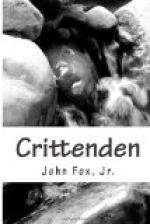Judith and Crittenden were out of the push of cart, carriage, wagon, and street-car now, and out of the smoke and dust of the town, and Crittenden pulled his horse down to a slow trot. The air was clear and fragrant and restful. So far, the two had spoken scarcely a dozen words. Crittenden was embarrassed—he hardly knew why—and Judith saw it, and there was a suppressed smile at the corners of her mouth which Crittenden did not see.
“It’s too bad.”
Crittenden turned suddenly.
“It’s a great pleasure.”
“For which you have Mrs. Stanton to thank. You would have got it for yourself five—dear me; is it possible?—five years ago.”
“Seven years ago,” corrected Crittenden, grimly. “I was more self-indulgent seven years ago than I am now.”
“And the temptation was greater then.”
The smile at her mouth twitched her lips faintly, and still Crittenden did not see; he was too serious, and he kept silent.
The clock-like stroke of the horse’s high-lifted feet came sharply out on the hard road. The cushioned springs under them creaked softly now and then, and the hum of the slender, glittering spokes was noiseless and drowsy.
“You haven’t changed much,” said Judith, “except for the better.”
“You haven’t changed at all. You couldn’t—for better or worse.”
Judith smiled dreamily and her eyes were looking backward—very far backward. Suddenly they were shot with mischief.
“Why, you really don’t seem to—” she hesitated—“to like me any more.”
“I really don’t—” Crittenden, too, hesitated—“don’t like you any more—not as I did.”
“You wrote me that.”
“Yes.”
The girl gave a low laugh. How often he had played this harmless little part. But there was a cool self-possession about him that she had never seen before. She had come home, prepared to be very nice to him, and she was finding it easy.
“And you never answered,” said Crittenden.
“No; and I don’t know why.”
The birds were coming from shade and picket—for midday had been warm—into the fields and along the hedges, and were fluttering from one fence-rail to another ahead of them and piping from the bushes by the wayside and the top of young weeds.
“You wrote that you were—’getting over it.’ In the usual way?”




